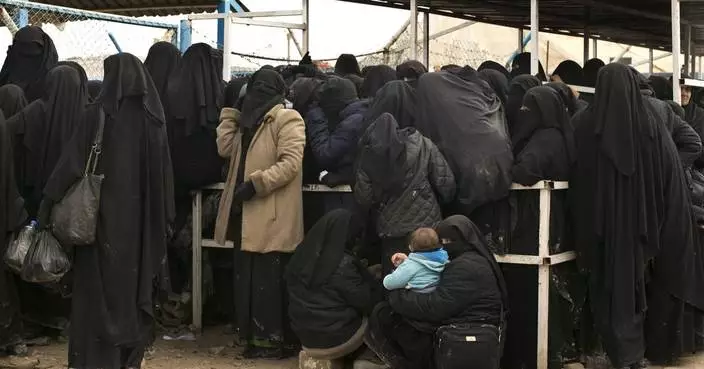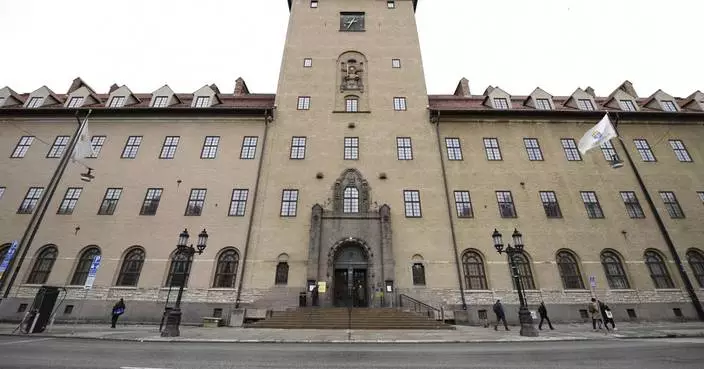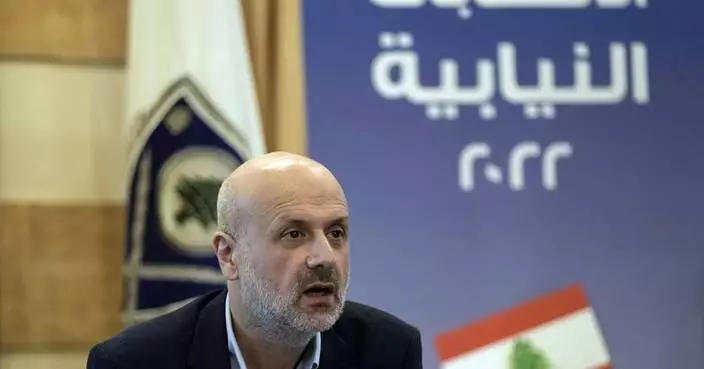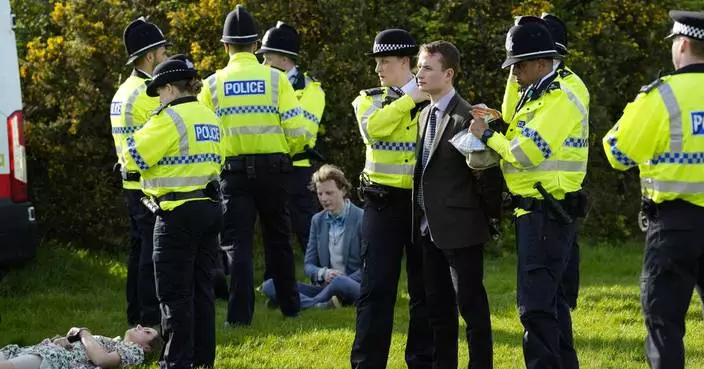With President Bashar Assad seemingly poised to survive the Syrian civil war, Israeli leaders are growing nervous about the intentions of his Iranian patrons and their emerging corridor of influence across the region.
Prime Minister Benjamin Netanyahu is agitating against Iran in global forums like this week's U.N. General Assembly. The Israeli military is holding war games targeting the Iran-backed Lebanese Hezbollah, and generals are issuing tough threats in hopes of avoiding what could be another ruinous Israeli entanglement in Lebanon, this time with Iranian advisers and troops on Israel's doorstep.
Israel has long identified Iran as its biggest threat, citing its suspect nuclear program, development of long-range missiles and hostile rhetoric. But gains by Syrian troops and their Iranian-backed allies have given those concerns new urgency.
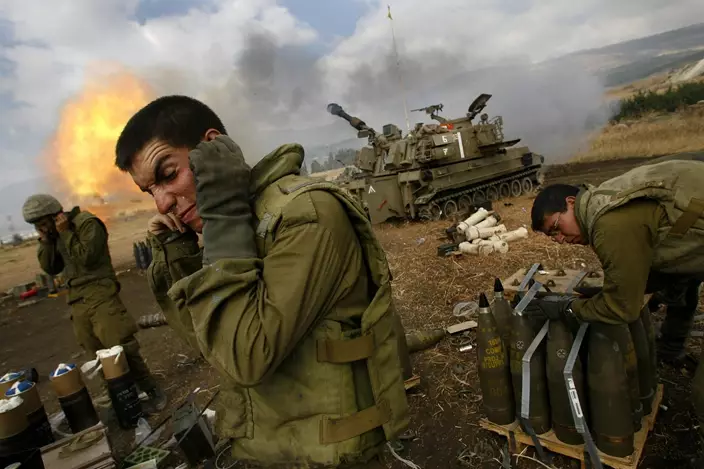
FILE - In this July 21, 2006 file photo, Israeli soldiers cover their ears as an artillery unit fires shells towards southern Lebanon from a position near Kiryat Shmona in northern Israel, near the border with Lebanon. (AP Photo/David Guttenfelder, File)
Israel fears the establishment of a Shiite "corridor," with land links from Iran to Lebanon, allowing the movement of fighters and weapons across the region. At the heart of those fears is Hezbollah, the Lebanese militia that battled Israel to a stalemate in a monthlong war in 2006. The group has greatly beefed up its arsenal of rockets and missiles since then, and after years of fighting in Syria, is more battle-tested than ever.
In his U.N. address Tuesday, Netanyahu warned that Iran was spreading a "curtain of tyranny and terror" across the region, and said Israel would defend itself.
"We will act to prevent Iran from establishing permanent military bases in Syria for its air, sea and ground forces. We will act to prevent Iran from producing deadly weapons in Syria or in Lebanon for use against us. And we will act to prevent Iran from opening new terror fronts against Israel along our northern border," he said.
Israel last week wrapped up its largest military exercise in two decades — mobilizing some 30,000 troops to train for the next war against Hezbollah.
In an exclusive interview with The Associated Press, the commander of the exercise, Maj. Gen. Tamir Hayman, said that despite Hezbollah's gains, the balance of power has greatly shifted in favor of Israel since 2006.
"If Hezbollah's capabilities have grown linearly, ours have grown exponentially, in intelligence, in targets and in the ability to attack," he said. If fighting resumes, "the damage to Hezbollah will be severe, mortal and comprehensive."
He said he was pleased with the performance of his troops, and said the two-week drill should send a powerful message of deterrence.
"We have no intentions at this time to go out and defeat Hezbollah. Our goal is to maintain the quiet and stability in the north," said Hayman, the commander of the army's Northern Corps.
Israeli forces on Tuesday shot down what Israel said was a Hezbollah surveillance drone that veered too close to the Syrian border with Israel. The military said the unmanned aircraft was Iranian-made and launched from a Damascus airport before it was shot down near the Israeli-controlled side of the Golan Heights.
After six years of fighting that claimed at least 400,000 lives, Assad's forces appear to have finally gained the upper hand as they recapture territory from the Islamic State group and opposition fighters.
Russia, which is waging an air campaign on behalf of Assad, and Iran and Hezbollah, which have fighters on the ground, have provided crucial support and are expected to play a major role in postwar Syria.
"The vector is quite clear right now, with the Syrian army, Hezbollah and the Shiite militias gradually regaining control of large swaths of the country," said Chagai Tzuriel, the director general of the Israeli Intelligence Ministry.
Israel has said any permanent presence of Iranian or Hezbollah troops along the Syrian border with Israel would be crossing a "red line," hinting that it would be willing to take military action if needed. Tzuriel warned of a "regional conflagration."
He said Russia could end up playing a positive role, because it wants to stabilize Syria. He said the Russians realize that Iran could create friction not only with Israel, but also with the Sunni majority in the region.
"I think there is a good chance that it will limit and restrain Iran, Hezbollah and the Shiite militias," he said.
But that is far from clear. Netanyahu last month flew to Russia to discuss Syria with President Vladimir Putin, but apparently returned home emptyhanded. Israeli media last week said Russia had rejected an Israeli request to keep the Shiite forces at least 60 kilometers (40 miles) from the border. Neither side has commented on the reports.
Intelligence Minister Yisrael Katz recently claimed at a security conference that Iran and Syria are working on an agreement that could bring an Iranian naval base, airport or army bases to Israel's doorstep, a major boost for Hezbollah.
"The Iranians may bring different kinds of missiles to Syria, and a large and well-equipped force of Shiite militias may settle there, including tens of thousands of Afghans, Pakistanis, Iraqis and Syrians whose goal is to threaten and battle Israel," Katz said. "Hezbollah will train and command the Shiite militias."
Israel has attempted to stay on the sidelines throughout the Syrian war. But it has admitted to carrying out dozens of airstrikes on what are believed to be shipments of "game changing" weapons, such as guided missiles or anti-aircraft systems, bound for Hezbollah. Syria accused Israel of carrying out a recent airstrike against a Syrian military facility, possibly linked to either missile production or chemical weapons.
Hayman said last week's drill was only focused on Lebanon, and that Israel would try to keep any future fighting from spreading beyond Lebanon.
After years of fighting in Syria, Hezbollah does not appear to be in a rush to battle Israel. The group has lost an estimated 1,500 fighters in Syria and is also suffering from low morale and financial pressure. But as it withdraws from Syria, it is expected to look south, to its main nemesis.
"Hezbollah now has a force similar to those of a conventional army without losing its experience in guerrilla warfare," said Qassim Qassir, a Lebanese expert on Hezbollah. "Hezbollah today is stronger than before and this is what made Israel carry out this drill to show their force."
BEIT MERI, Lebanon (AP) — Lebanon’s interior minister alleged Wednesday that the mysterious abduction and killing of a Hezbollah-linked Lebanese currency exchanger in a villa on the edge of a quiet mountain resort town earlier this month was likely the work of Israeli intelligence operatives.
The killing of Mohammad Srour, 57, who was sanctioned by the U.S., was like something out of an international spy thriller. Pistols equipped with silencers and gloves were found in a bucket of water at the scene, along with chemicals apparently intended to remove fingerprints and other evidence, Interior Minister Bassam Mawlawi said in an interview with The Associated Press. Thousand of dollars in cash were left scattered around Srour’s body, as if to dispel any speculation that robbery was the motive.
“Lebanese security agencies have suspicion or accusations that Mossad was behind this operation,” Mawlawi said, referring to the Israeli spy agency. “The way the crime was carried out led to this suspicion.”
He provided no specific evidence for his allegations. Mawlawi said the investigation is still ongoing and once it's over, the results will be made public and referred to judicial authorities.
The Israeli prime minister’s office, which oversees Mossad, did not immediately respond to a request for comment.
The suspicion by Lebanon’s security agencies that the crime could be the work of Israeli agents comes at a time when Lebanon’s southern border region has been rocked by ongoing clashes between militants of the Hamas-allied Hezbollah group and Israeli troops.
The U.S. Treasury sanctioned Srour in 2019 over his alleged money transfers from Iran through Hezbollah to the Palestinian militant group Hamas in the Gaza Strip.
“Mohammad Srour’s activity in money exchange is known, as are the transfers of money from which side to which side,” Mawlawi said.
Srour’s killing earlier this month, came as U.S. and Israeli officials have been trying to crack down on transfers of funds to Hamas. The push has intensified following the Oct. 7 Hamas-led attack on southern Israel that triggered the devastating war in Gaza and its ripple effects around the region.
Last month, a senior U.S. Treasury official visiting Beirut pressed Lebanese authorities to prevent funds from being funneled to Hamas through the tiny country. Jesse Baker, deputy assistant secretary of the Treasury for Asia and the Middle East in the Office of Terrorist Financing and Financial Crimes, met with top Lebanese political and financial officials.
Israel's military said it has killed a number of money exchangers in Gaza for allegedly funding Hamas.
Srour’s killing was clearly planned in advance. Three Lebanese judicial officials familiar with the investigation told the AP that a man posing as a customer had contacted Srour from abroad and asked him to deliver a cash transfer to a woman in the mountain resort of Beit Meri.
The officials, who spoke on condition of anonymity because the investigation is ongoing, said Srour first went with his nephew and left after handing the woman the money. He was contacted by the same person with another request a day after his first visit, the officials said. This time he went alone, after which his family lost contact with him.
Mawlawi said the cellphone the woman used to get in touch with Srour was only activated to contact him.
He said the perpetrators had first tried to rent an apartment in Beirut’s southeastern suburb of Hazmieh, a detail that has not been previously reported, but they later canceled, apparently because “they did not find (the apartment) suitable to carry out the operation."
Mawlawi said the killers then shifted to the quiet town of Beit Meri, famous for its posh homes with red-brick roofs, sprawling forest and Roman-era archaeological site, where they rented a three-story villa on the edge of the town using fake Lebanese identity cards. The General Security Directorate is looking into the identities of people who entered and left the country around the period of the killing, he said.
Srour went missing on April 3 in Beit Meri, and his body was found a week later in the villa. Mawlawi said investigators found “a large number of bullet” wounds in different parts of his body, including his arms and legs. He was reportedly handcuffed.
The villa is located on a quiet side street lush with trees.
“We did not hear anything,” said Christian Francis, who lives across the street from the villa where Srour was killed. He added that most people in the highly secured area have dogs, while municipal police have a checkpoint nearby and the Lebanese army has a post few hundred meters (yards) away.
Beit Meri’s mayor, Roy Abou Chedid, told the AP that the apartment was rented in late February to an unknown person for one year for $48,000. He added that the family that owns the villa did not register the rental contract at the municipality but had paid its municipal taxes on time in November.
“The operation was carried out in a way that is more than professional,” Abou Chedid said, adding that the neighbors did not suspect anything and it took security agencies some time to locate which house Srour’s body was in.
A Hezbollah spokesperson declined to comment on the killing citing the ongoing investigation. The spokesperson refused to say whether Srour was a Hezbollah member but said that he worked in the past for the al-Qard al-Hasan Association, the financial arm of the Iran-backed group.
Israel has a long history of targeted killings in Lebanon, including drone strikes that have killed high-ranking Hezbollah commanders over the past six months. At least 260 Hezbollah members have been killed by Israel in that period.
The U.S. has accused Srour of transferring tens of millions of dollars annually from Iran’s Islamic Revolutionary Guard Corps to Hamas’ military wing, the Qassam Brigades, alleging that starting in 2014, Srour “was identified as in charge of all money transfers” from the IRGC to the Qassam Brigades.
Srour’s family members have not given media interviews since his body was found but said in a televised statement that all his financial transactions were transparent and he simply worked in currency exchange. They urged security agencies to swiftly find the perpetrators.
During Srour’s funeral in his hometown of Labweh in northeast Lebanon, a Hezbollah flag was flown over his coffin and scores of men and women chanted “death to America and death to Israel” as they marched toward the cemetery.
Chehayeb reported from Beirut. Associated Press writer Josef Federman contributed to this report from Jerusalem.
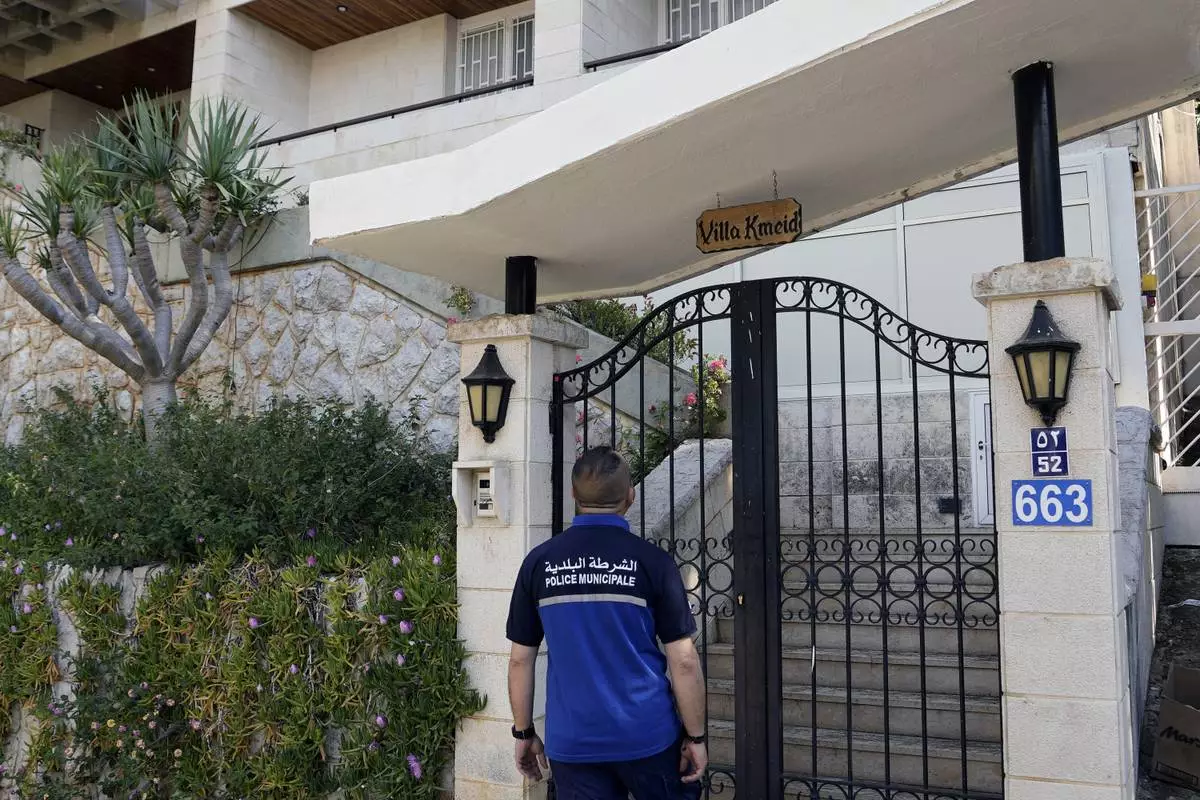
A municipal police officer stands outside a villa where the Lebanese money changer Mohammad Srour, 57, was found tortured and killed in Monte Verdi neighborhood of Beit Meri, Lebanon, Tuesday, April 16, 2024. Lebanon’s interior minister alleged Wednesday that the mysterious abduction and killing of a Hezbollah-linked Lebanese financier in a villa on the edge of a quiet mountain resort town earlier this month was likely the work of Israeli operatives. (AP Photo/Hassan Ammar)
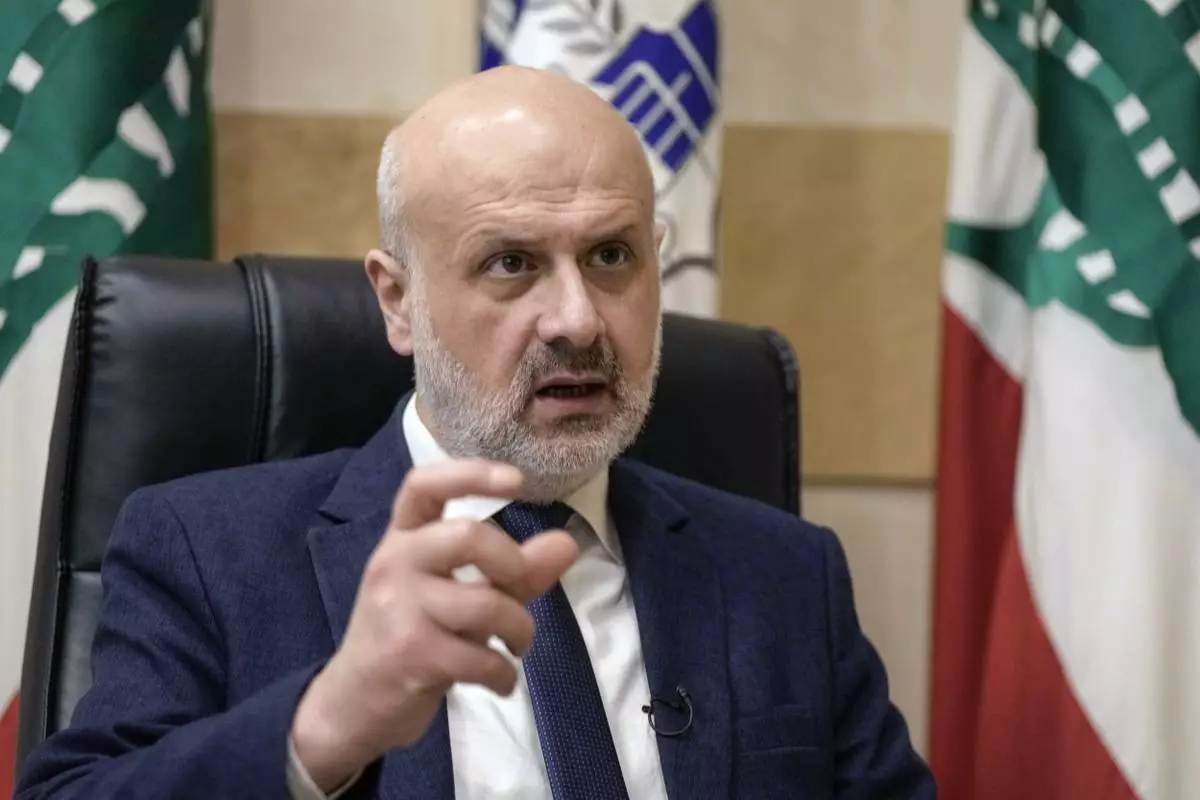
Lebanese Interior Minister Bassam Mawlawi, speaks during an interview with the Associated Press at the interior ministry in Beirut, Lebanon, Tuesday, April 16, 2024. Lebanon’s interior minister alleged Wednesday that the mysterious abduction and killing of a Hezbollah-linked Lebanese financier in a villa on the edge of a quiet mountain resort town earlier this month was likely the work of Israeli operatives. (AP Photo/ Hassan Ammar)
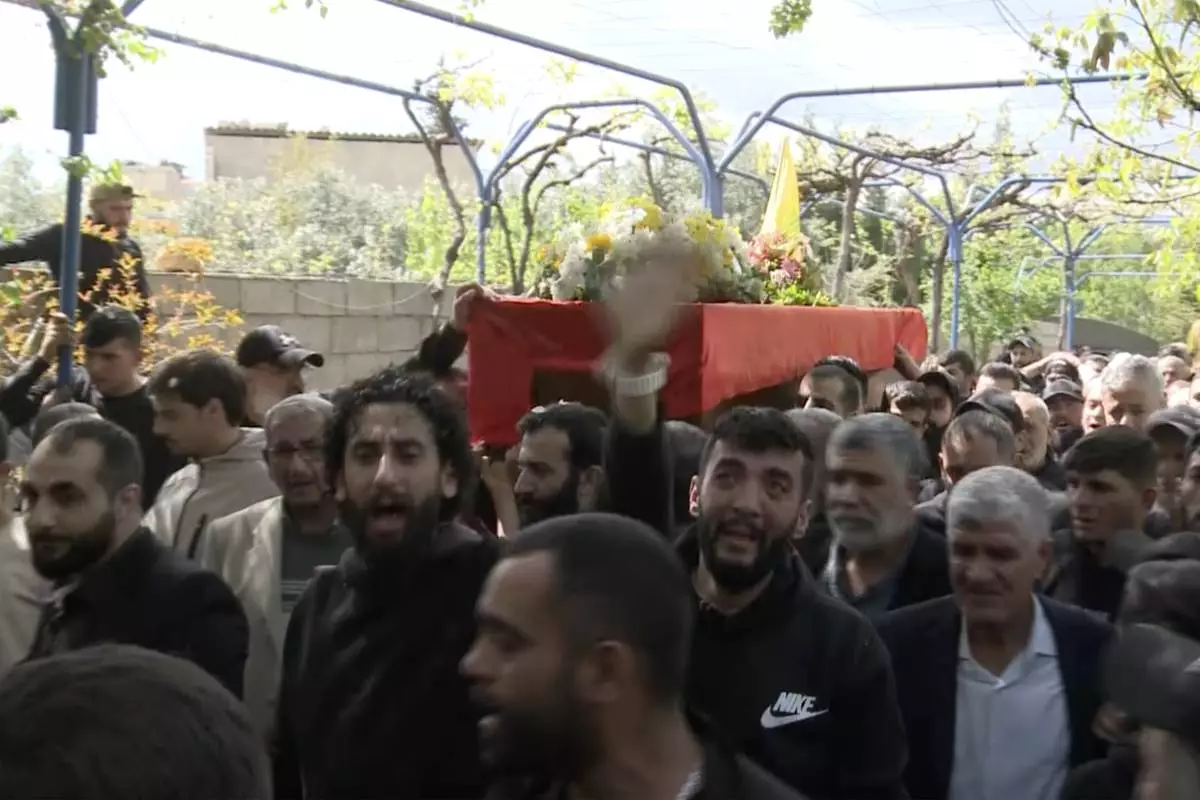
In this grab taken from video, mourners carry the coffin of Lebanese money changer Mohammad Srour, 57, who was found tortured and killed inside a villa in Monte Verdi neighborhood of Beit Meri, during his funeral procession in Labweh village, near the border with Syria, northeast Lebanon, Thursday, April 11, 2024. Lebanon’s interior minister alleged Wednesday that the mysterious abduction and killing of a Hezbollah-linked Lebanese financier in a villa on the edge of a quiet mountain resort town earlier this month was likely the work of Israeli operatives. (AP Photo)
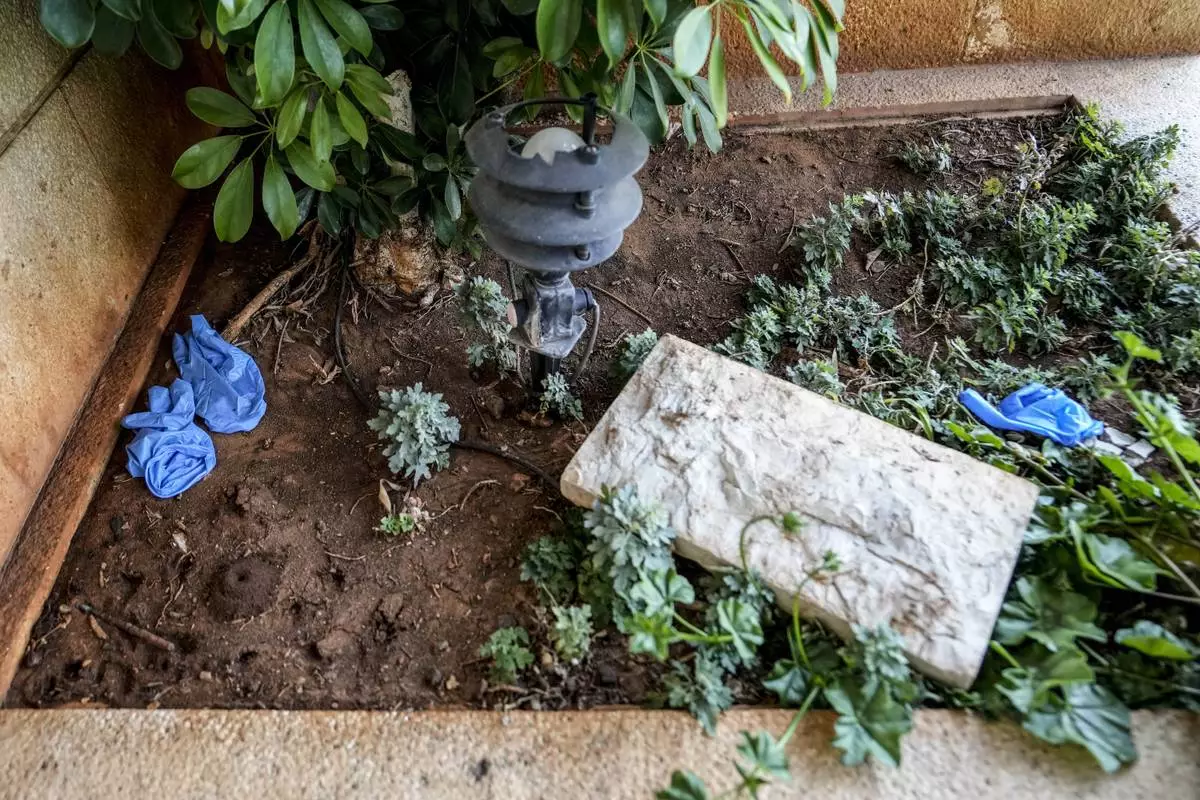
Medical gloves sit outside a villa where money changer Mohammad Srour, 57, was found tortured and killed in Monte Verdi neighbourhood of Beit Meri, Lebanon, Tuesday, April 16, 2024. Lebanon’s interior minister alleged Wednesday that the mysterious abduction and killing of a Hezbollah-linked Lebanese financier in a villa on the edge of a quiet mountain resort town earlier this month was likely the work of Israeli operatives. (AP Photo/Hassan Ammar)
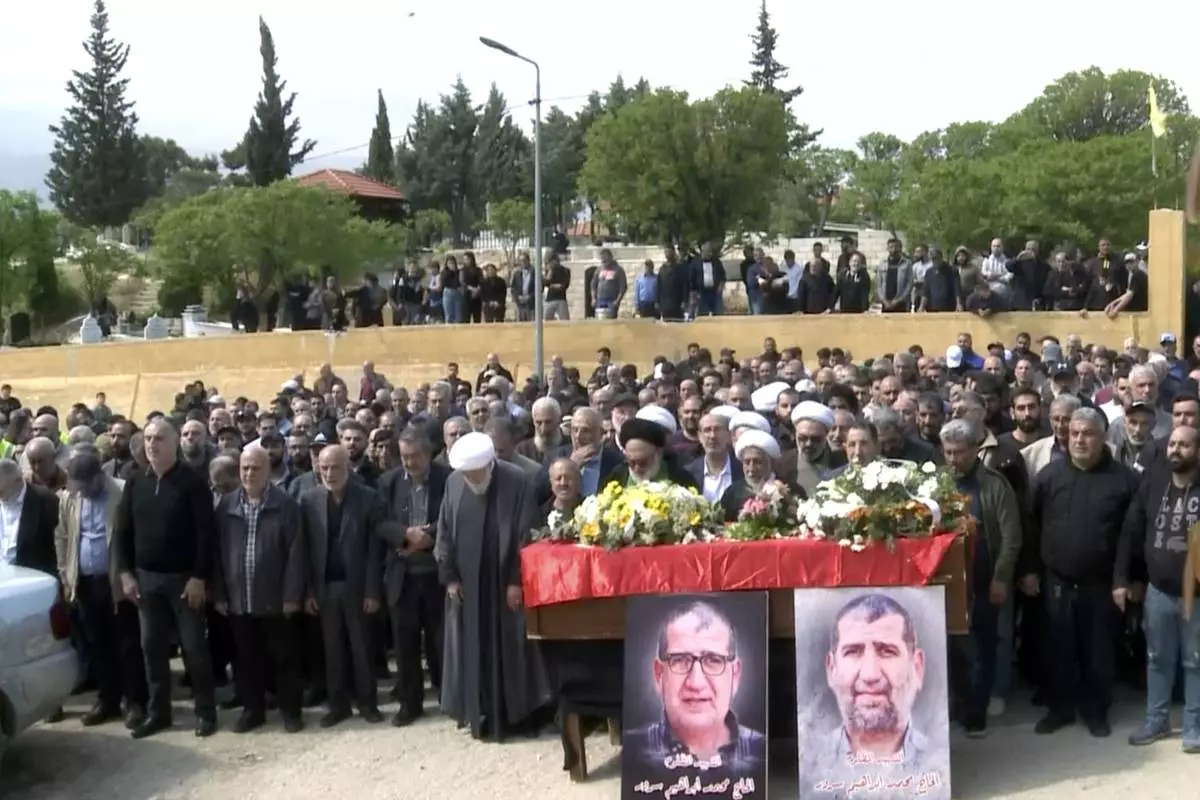
In this grab taken from video, mourners pray over the coffin of Lebanese money changer Mohammad Srour, 57, who was found tortured and killed inside a villa in Monte Verdi neighborhood of Beit Meri, during his funeral procession in Labweh village, near the border with Syria, northeast Lebanon, Thursday, April 11, 2024. Lebanon’s interior minister alleged Wednesday that the mysterious abduction and killing of a Hezbollah-linked Lebanese financier in a villa on the edge of a quiet mountain resort town earlier this month was likely the work of Israeli operatives. (AP Photo)
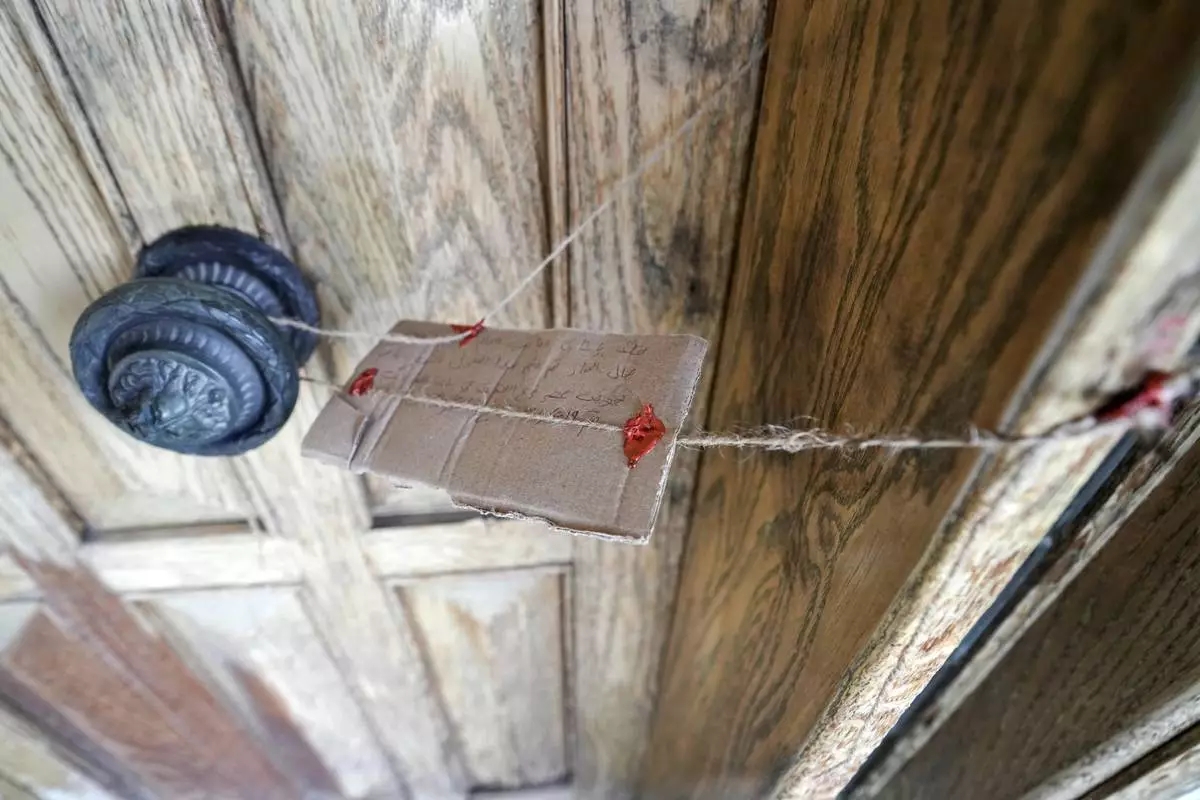
Lebanese authorities sealed the main door of a villa where money changer Mohammad Srour, 57, was found tortured and killed in Monte Verdi neighbourhood of Beit Meri, Lebanon, Tuesday, April 16, 2024. The mysterious abduction and murder of a United States-sanctioned Lebanese money changer in a three-story villa on the edge of a quiet mountain resort town overlooking Beirut was most likely the work of Israeli operatives, Lebanon's interior minister said Wednesday. (AP Photo/Hassan Ammar)

Municipal police officers patrol outside a villa where the Lebanese money changer Mohammad Srour, 57, was found tortured and killed in Monte Verdi neighbourhood of Beit Meri, Lebanon, Tuesday, April 16, 2024. Lebanon’s interior minister alleged Wednesday that the mysterious abduction and killing of a Hezbollah-linked Lebanese financier in a villa on the edge of a quiet mountain resort town earlier this month was likely the work of Israeli operatives. (AP Photo/Hassan Ammar)











